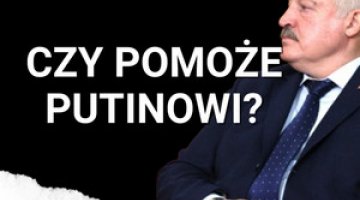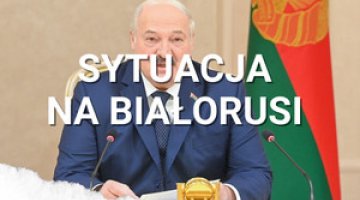Belarus: the policy of repression continues
The Belarusian government has gone beyond cracking down on demonstrations after the presidential elections on 19 December, and are still engaged in large-scale actions aimed at breaking up opposition structures and restricting the independent media’s activity. This tactic has been adopted due to Alyaksandr Lukashenka’s fear that the limited democratisation which has been taking place over the past few months could weaken his position and the unity of the regime. However, the main reason for this return to the policy of repression is the support Lukashenka received from Russia before the elections. This is why his government will continue its policy of repression and tightening public control in the immediate future. In effect, the issue of political prisoners may reappear in Belarus-EU relations and thus significantly limit the dialogue between Minsk and Brussels.
Reasons for resuming the policy of repression
The crackdown on the opposition’s demonstrations on 19 December marked the end of the policy of limited democratisation of political life which the Belarusian government had been applying over the past few months. Everything seems to indicate that the use of force against opposition supporters was a planned action and not a spontaneous reaction from the government. A week before the elections, representatives of the Belarusian government and law enforcement authorities were warning of provocations from Lukashenka’s counter-candidates. It was suggested that the opposition had been gathering heavy tools and explosives. However, according to the audiovisual documentation available on the Internet, the individuals who broke down the door of the government building were in fact law enforcement officers. It can therefore be assumed that the government decided to provoke incidents so they could employ repressive tactics and thus demonstrate the strength of the regime and the stability of the authoritarian system. It cannot be ruled out that Lukashenka became afraid that the limited democratisation started several months ago could destabilise the system he had created, and that the opposition could gradually gain real public support. It is worth emphasising that the level of public support Lukashenka really received during the election is unknown.
It seems that the support Lukashenka received from Russia before the elections was the main reason why he decided he could allow himself to demonstrate his force. During a summit in Moscow on 9 December, the leaders of Russia, Belarus and Kazakhstan signed agreements establishing the Common Economic Space (CES), a new integration structure created upon the Kremlin’s initiative. Belarus received political support and preferential oil supply conditions in exchange for signing agreements which were important for Moscow. At the same time, Lukashenka might have come to the conclusion that the EU was convinced that the policy of isolation applied towards Belarus until 2008 had proven ineffective, and that they would not break off relations with Minsk despite the present repression.
The repression continues
Around 500 demonstrators are now being held at the KGB’s detention facility in Minsk (they are likely to be gradually released as of 29 December). In turn, charges under article 293 of the criminal code (organising public unrest on a mass scale, which carries a 15-year sentence) have been brought against 26 individuals, including most of Lukashenka’s counter-candidates). It must be expected that new political prisoners will be held in Belarus. The Belarusian government is reacting sharply to any signs of public resistance. Relatives and friends of the detained, who have gathered to show their solidarity near Minsk detention facilities, are being dispersed or arrested. Moreover, the private apartments of opposition activists, the offices of legal political parties (including the United Civil Party of Belarus) and the independent media (European Radio for Belarus, Belsat TV and the Nasha Niva newspaper) have been searched. Documents and computers have been confiscated.
The regime has made attempts to play individual opposition leaders off against one another, which is aimed at discrediting the Belarusian democratic forces. Last week the official media carried statements by three presidential candidates, Yaroslav Romanchuk, Ryhar Kastusiou and Dzmitry Us, condemning the democratic opposition’s behaviour during the demonstration, and accusing its organisers of provoking clashes with the militia. The crackdown on the opposition has effectively intimidated or discouraged those opposition activists still at liberty from taking any activity. The fact that the key leaders of democratic forces are being held in detention also has a strong impact on the situation. Additionally, the public is not ready yet to openly show any resistance to the government’s actions.
The Russian stance
Moscow did not call into question Lukashenka’s re-election. At the beginning the Russian president, Dmitri Medvedev, stated the presidential election was an internal affair of Belarus and then, on 25 December, he sent his congratulations to President Lukashenka. At the same time, over the past few days, important Russian TV stations showed several lengthy reports on elections in Belarus. The result Lukashenka achieved in the election was called into question, and the Belarusian government were accused of treating the opposition brutally and employing mass forgeries (recordings were presented which reportedly proved the forgeries during the ballot counting). Such criticism would not have been possible in the Russian media without the Kremlin’s support. This looks like a planned campaign. The way in which reports on the Belarusian elections have been presented, and the post-election commentaries in the Russian media, prove that Moscow is sending Lukashenka a message – namely that he should not take Russian support for granted. It is conditional and depends on Lukashenka keeping the promises he made before the elections (mainly regarding the establishment of the CES).
Impact on relations with the West
The brutal mass repression applied by the Belarusian government gave rise to a wave of protests in most EU member states, the USA and Canada. The European Parliament and the Council of the European Union are to decide in January on how the EU will respond to Minsk’s recent actions. For this reason, more and more observers are mentioning the possibility of the reimposition of visa sanctions against representatives of the Belarusian regime, and a potential extension of the list of individuals whom those sanctions will cover. It is also likely – at least partly – that the implementation of projects as part of the multilateral co-operation within the framework of the Eastern Partnership, and financial support from the European Investment Bank or the European Bank for Reconstruction and Development, will be withheld. Additionally, talks on the European Union’s provisional Action Plan for Belarus are likely to be suspended. In an extreme situation, negotiations regarding visa facilitations for Belarusian citizens travelling to the Schengen Area may be blocked. Restrictions on co-operation with the International Monetary Fund are also possible.
Forecast
Everything seems to indicate that the Belarusian government will continue its policy of repression. It is likely that some political groupings will be banned and some opposition leaders will be sentenced to imprisonment. The new wave of repression will certainly also discourage some activists from engagement in opposition activity.
By toughening his internal policy, President Lukashenka wants to prove that his authoritarian system is stable, and that he has total control of the situation in Belarus. His further goal is to break down the opposition’s organisational structures, cut off its financing sources and deprive it of its most active leaders. Moreover, making some of his rivals issue statements condemning the demonstration of 19 December may mark the beginning of the creation of a ‘licensed’ opposition, which will not be persecuted, and may even be allowed to enter parliament.
The December agreements between Russia and Belarus regarding economic integration and crude oil supplies have not removed all the sticking points between them. Therefore, the appearance of another crisis between Minsk and Moscow seems to be just a question of time. At that point Lukashenka, deprived of Western support, may be forced to make concessions, including selling key Belarusian companies (such as refineries and machine plants) to Russian investors.
It is very likely that the problem of political prisoners will arise in EU/Belarusian relations, for the first time since 2008), which will significantly restrict the co-operation between the two parties. It cannot be ruled out within a year, the Belarusian regime will try to resume its previous policy of releasing selected prisoners in exchange for actions by the West which will benefit the regime.
Kamil Kłysiński
assisted by Wojciech Konończuk





